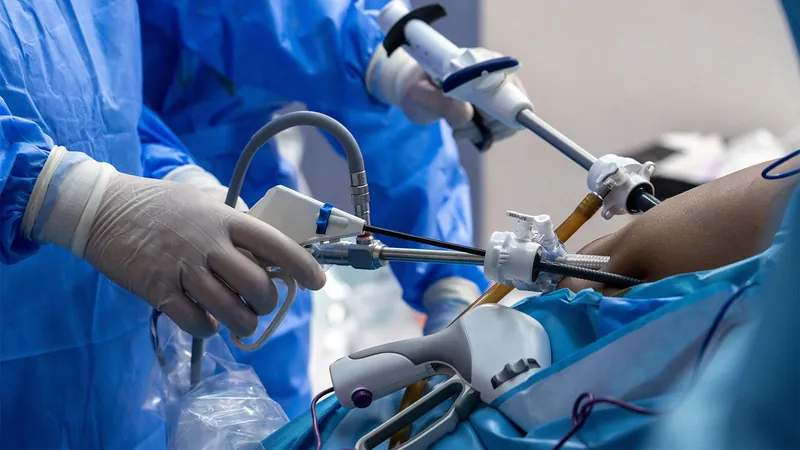
Revolutionary Findings: Bariatric Surgery in Teens Shows Lasting Weight Loss a Decade Later!
2024-10-30
Author: Li
A groundbreaking study has revealed that adolescents who undergo bariatric surgery can expect durable weight loss that lasts up to 10 years. These findings, derived from the Teen Longitudinal Assessment of Bariatric Surgery (Teen-LABS) study, shed light on the long-term effectiveness of surgical interventions for severe obesity in youth.
In this extensive research, 260 adolescents were monitored post-surgery, reporting an impressive mean decrease in body mass index (BMI) of 20% over the decade (95% CI -22.9 to -17.1, P<0.001). The data, shared by Justin R. Ryder, PhD, from the Ann and Robert H. Lurie Children's Hospital of Chicago, provides compelling evidence that both gastric bypass and sleeve gastrectomy yield comparable results, with mean BMI changes of 20.6% and 19.2%, respectively.
But that's not all! This study not only highlights sustainable weight loss but also shows significant improvements in coexisting health conditions. Remarkably, after 10 years, 55% of participants saw remission of type 2 diabetes, 57% with hypertension, and 54% with dyslipidemia. This is a staggering contrast to adult statistics, as those struggling with type 2 diabetes saw just 18% and 12% remission rates in previous studies at 7 and 12 years.
The research underscores a need for healthcare providers, especially pediatricians, to consider bariatric surgery as a viable option for adolescents battling severe obesity. As Ryder pointed out, the findings support recent recommendations from the American Academy of Pediatrics regarding surgical treatment. Importantly, the explosion of effective anti-obesity medications, particularly GLP-1 receptor agonists like liraglutide (Saxenda) and semaglutide (Wegovy), which have seen a nearly 600% increase in prescriptions among young people, calls for a comparative analysis of medical versus surgical interventions.
Ryder reflected on the significance of the Teen-LABS study, stating, “This is the longest follow-up study on adolescent bariatric surgery to date, with previous research limited to five years or less.” The results validate the notion that adolescent bariatric surgery is a safe, effective, and enduring treatment option.
The Teen-LABS investigation involved adolescents aged 13 to 19 years, with 161 subjects undergoing gastric bypass and 99 being treated with sleeve gastrectomy, all averaging around 17 years of age. Impressively, 83% of the participants completed 10-year follow-up visits.
Additionally, researchers found four distinct patterns in BMI changes over time: 1. **Rapid Initial Gain**: Individuals who peaked at -6 months and gained weight afterward (+7.1% change). 2. **Slow Recovery**: Those who hit a low point at 1 year and then increased (-12.6% change). 3. **Stable After Initial Drop**: Participants who reached a low at 1 year and maintained it (-26.9% change). 4. **Sustained Weight Loss**: A cohort that fell to their lowest at 5 years, which they maintained (-43.7% change).
Analysis indicated that early significant weight loss was crucial for long-term positive outcomes.
Despite the success, the study isn’t without limitations, such as its observational nature, smaller sample sizes for certain conditions, and absence of a control group.
In conclusion, these results provide hope and direction for adolescents with severe obesity, potentially transforming lives and encouraging a holistic approach to managing this pressing health issue. As society continues to grapple with obesity, providing effective solutions is more important than ever!


 Brasil (PT)
Brasil (PT)
 Canada (EN)
Canada (EN)
 Chile (ES)
Chile (ES)
 Česko (CS)
Česko (CS)
 대한민국 (KO)
대한민국 (KO)
 España (ES)
España (ES)
 France (FR)
France (FR)
 Hong Kong (EN)
Hong Kong (EN)
 Italia (IT)
Italia (IT)
 日本 (JA)
日本 (JA)
 Magyarország (HU)
Magyarország (HU)
 Norge (NO)
Norge (NO)
 Polska (PL)
Polska (PL)
 Schweiz (DE)
Schweiz (DE)
 Singapore (EN)
Singapore (EN)
 Sverige (SV)
Sverige (SV)
 Suomi (FI)
Suomi (FI)
 Türkiye (TR)
Türkiye (TR)
 الإمارات العربية المتحدة (AR)
الإمارات العربية المتحدة (AR)